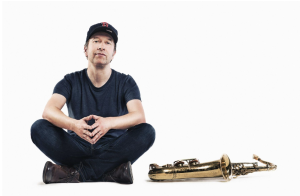There’s a quiet devastation at the heart of “Werewolf”, the latest release from indie shapeshifters Pinwheel Valley — a track that hums with spectral beauty and emotional rawness. Released via Hot Soap Records on June 10th, the song finds frontman Qais Khoury, the Jordanian-Canadian artist behind the project, grappling with transformation in the shadow of neglect, societal dislocation, and personal reckoning.
Opening on hushed piano and ghostlike guitar textures, “Werewolf” arrives like a breath held too long. Khoury’s voice — husky, searching, unmistakably human — carries the track from confessional murmur to cinematic ache. There’s a sense of unraveling built into the bones of the song, and by the time it reaches its slow-burning crescendo, you’re left staring into the mirror alongside him, questioning what parts of yourself were shaped by survival rather than choice.
Lyrically, it’s unflinching. “Werewolf” doesn’t wear its metaphors lightly — the shape-shifter is a motif for fractured identity, for instinctual pain beneath a composed exterior. In Khoury’s hands, it’s not just gothic imagery, but a metaphor for navigating a world that demands both vulnerability and armor. Fans of Jeff Buckley’s tortured falsetto, Bon Iver’s melancholic soundscapes, or even early Coldplay’s emotional scale will find a familiar emotional wavelength here, but Pinwheel Valley’s take is distinctly their own: globe-spanning, genre-melding, and unapologetically poetic.
Produced by Khoury and co-mixed with Andreas Matheou, the track benefits from meticulous craftsmanship — every swell and fade feels intentional, the arrangements spacious but never hollow. Robb Robinson’s mastering (Jason Mraz, Switchfoot) adds a final polish that allows the emotional punch to land cleanly, without compromise.
As with their award-winning visuals and increasingly ambitious live shows, “Werewolf” solidifies Pinwheel Valley’s reputation for marrying artistic depth with accessibility. Their songs don’t shout — they haunt. They linger. And in a music landscape often too obsessed with virality and volume, that restraint is its own kind of rebellion.







